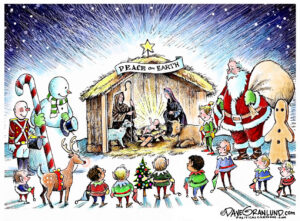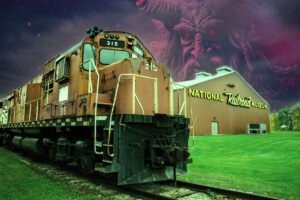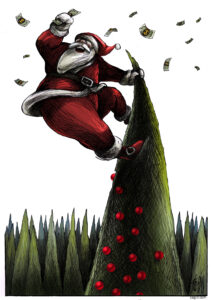Between a Japanese Christmas and a French Halloween
Will Christmas in America end up like Christmas in Japan, or Halloween in France? That is to say, a merchandising opportunity that eventually flopped.Several years ago a French manufacturer of children’s party costumes found himself in the United States at the end of October and discovered Halloween, which he had never heard of. He was bemused by this American whatever-it-was: Secular holiday? Religious feast? But to him, whatever it was, it provoked a flash of inspiration. What an opportunity to sell children’s costumes!
Back in France, I would imagine he consulted public relations people or merchandising specialists who had never heard of Halloween either. But some had American friends or informants, and transatlantic investigative expeditions were launched.
Soon articles began to appear here and there in the press about this wonderful children’s holiday from America. Was it American Indian? (They confused it with Thanksgiving.) Or Celt? Or an old English custom? Or maybe Dutch? Some suspicious people said it was pagan, or occult, or had to do with witchcraft.
Nobody knew, but the next October (conveniently coinciding with the fall school holiday), costumes of witches, skeletons, ghouls and ghosts began to appear in the shop windows. After that, children were being led off to parties by mothers or au pair girls all dressed up for Halloween.
But still, few in France knew what it was, or what it was for. The manufacturer at the source of it all, either through ignorance or prudence, had not brought along with the costumes the custom of trick or treats, or soap or eats, or whatever the regional variant of this juvenile blackmail threat. This was just as well, as I suspect the French would have balked at sending their children to knock on neighbors’ doors, and if candy were not forthcoming, overturn their trash cans or soap their windows.
At about the same time, scholarly journalists and students of American cultural anthropology began explaining that Halloween was a not-so-remote derivative of what in the rest of the Christian world was known as All Souls’ Day, and was the day after All Saints’ Day — Toussaint, on which proper French families visited the cemetery to place chrysanthemums on the graves of Grandfather and Grandmother and the late great-aunt Marie-Therese with whom their branch of the family had not spoken for 40 years — a solemn occasion. Now the little French children are back to going to parties as Spider-Man and Cinderella.
My reason for telling this unseasonable story is actually seasonal. It’s now Christmastime. Let me interpolate another story.
The first time I was in Japan, as a young man in the 1950s, it was Christmastime. To my astonishment, Tokyo was replete with jolly old Santas and their reindeer and helper elves, and shop windows were full of Victorian English families seemingly overwhelmed with good cheer, while the stores were filled with happy gift-shoppers.
What was it all about? Japan is not a Christian country. Had they caught Christmas fever from reading translations of Charles Dickens, or Clement Clarke Moore? That seemed doubtful. From the movies? From Japanese travelers before the war?
In any case Christmas was, and I believe remains, a big, big merchandising occasion for Japanese retailers, even though there is only a small Japanese Christian community. Historically, Nagasaki was the cradle of Christianity in Japan. Nagasaki! — where so much of Japan’s then-Christian population perished in an instant in 1945.
Another story: Last week I saw in the British press a protest from someone who had gone to the post office to buy stamps for Christmas cards. “All I’ve got left is Madonna and Child,” the clerk said. “That OK with you?”
I’m wondering whether Christmas in what still is called the Christian West, or formerly Christian West, is on its way to becoming Christmas in Japan. Or even Halloween in France — a merchandising opportunity that eventually flopped.
The United States is known throughout the West as the country where more people go to church than anywhere else. Is this on Christmas Day as well? Is there organized resistance to premature gift-opening, delaying the turkey and stuffing, cranberries and pumpkin pie, plus the football and classic movies on television, which is what Christmas mostly means these days for the middle-aged and over? Maybe it can all be put together. Not bad. But is it possible that a Japanese Christmas looms in our future? Or, worse, a French Halloween?
Visit William Pfaff’s Web site at www.williampfaff.com.
© 2009 Tribune Media Services, Inc.
Your support matters…Independent journalism is under threat and overshadowed by heavily funded mainstream media.
You can help level the playing field. Become a member.
Your tax-deductible contribution keeps us digging beneath the headlines to give you thought-provoking, investigative reporting and analysis that unearths what's really happening- without compromise.
Give today to support our courageous, independent journalists.






You need to be a supporter to comment.
There are currently no responses to this article.
Be the first to respond.